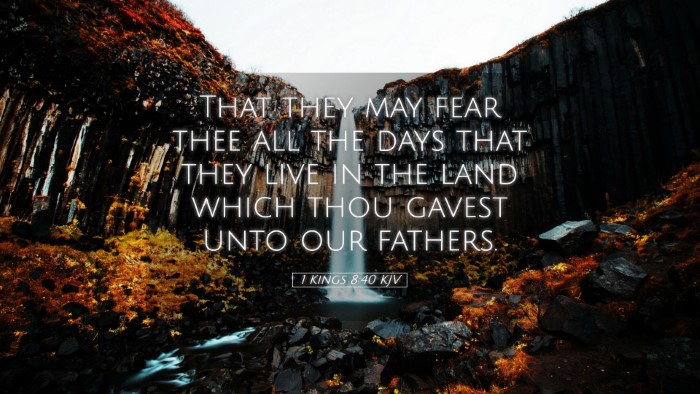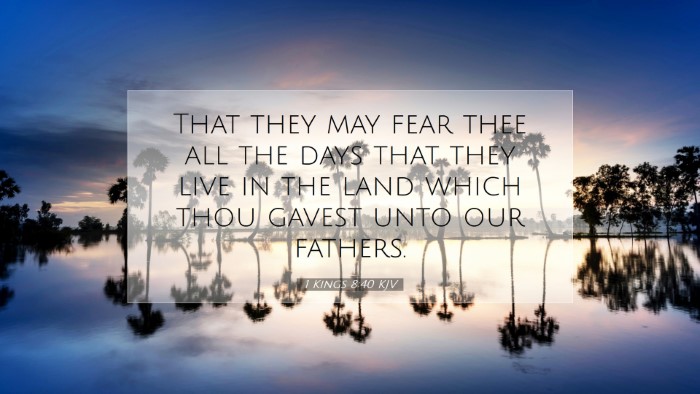Commentary on 1 Kings 8:40
1 Kings 8:40 states:
"That they may fear thee all the days that they live in the land which thou gavest unto our fathers, and that they may teach their children."
Introduction
This verse appears within the context of Solomon's dedicatory prayer during the temple's inauguration. It encapsulates not only a plea for divine favor but also emphasizes the transmission of faith through generations. Commentators such as Matthew Henry, Albert Barnes, and Adam Clarke provide insights that bridge contemporary understanding with the historical and theological significance of this plea.
Theological Significance
The heart of this verse focuses on fear of the Lord as an essential characteristic of a faithful life. The fear mentioned here is not a mere terror but a deep respect and reverence that shapes behavior and attitudes.
- Matthew Henry notes that this fear should be formed by an understanding of God's greatness and holiness, which subsequently leads to a heart of gratitude and obedience.
- Albert Barnes emphasizes that this fear is pivotal for sustaining a godly nation. He highlights that fearing God produces wisdom, as echoed in Proverbs, and therefore is foundational for the continuity of faith across generations.
- Adam Clarke points out that the notion of fear in relation to God ought to motivate individuals towards holiness and righteousness, creating a society that reflects divine principles.
Contextual Background
Understanding the context of 1 Kings 8 is paramount for grasping the full implication of the verse. Solomon, having built the temple, recognizes the importance of God’s presence among His people. The request for God's fear to be present is, therefore, not merely about spiritual fervor but is also a stabilizing force for community conduct.
Historical Context
This period in Israel’s history represents a transitional phase where the nation seeks to consolidate its identity following the establishment of the monarchy and the temple. Solomon’s prayer is set amidst this pivotal moment.
Cultural Implications
In ancient Israel, teaching children the ways of God was intrinsic to maintaining the covenantal relationship. Solomon’s concern represents a culture where faith intertwines with daily living, thereby influencing societal norms.
Educational Imperative
The latter part of the verse emphasizes that this fear should be taught to children. This has profound implications for both family and community life.
- Matthew Henry asserts that the responsibility of children’s spiritual education rests significantly with parents. He stresses that the acknowledgment of God must be a foundation upon which families are constructed.
- Albert Barnes positions the idea of teaching children as not merely academic but as a spiritual endeavor, where the transmission of faith is crucial for thelongevity of righteousness in society.
- Adam Clarke adds that this educational aspect is paramount; thus, instruction isn't incidental but an imperative stance for every generation – reflecting a holistic approach to spirituality.
Contemporary Application
For pastors, students, and theologians today, the verse challenges the modern church to consider how they foster a culture of reverential fear and spiritual education.
- The church must grapple with methods of inculcating a deep respect for God’s holiness amongst its members.
- Parents and church leaders share the responsibility to ensure that children grow in their knowledge and relationship with God.
- As societies shift and secular ideologies gain prominence, the need to maintain God-fearing principles as foundational in family and church must be revisited.
Conclusion
1 Kings 8:40 serves as a rich resource for understanding the necessity of fearing God in the life of the believer, the critical role of educating the next generation, and the overarching influence such practices hold in the community. The insights from esteemed commentaries provide a framework for applying this biblical truth throughout various contexts, ensuring that the reverence for God remains a living aspect of communal and personal faith journeys.


